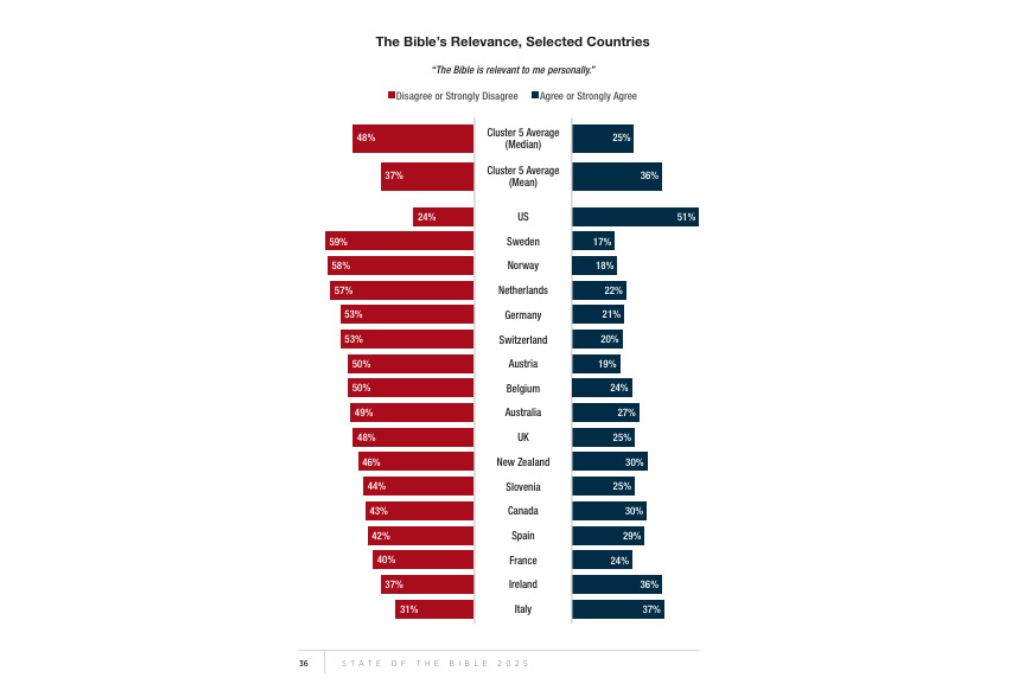
BRENTWOOD, Tenn. — In the past few years, Americans have grown generally more positive toward the Bible, but that doesn’t mean they’re reading it more.
According to a Lifeway Research study, U.S. adults increasingly view the Bible as a book worth reading multiple times, but few have actually done so.
More Americans describe the Bible as true, life-changing and helpful today, compared to a 2016 Lifeway Research study. Additionally, more than 2 in 5 Americans (44%) say the Bible is a book to read over and over again, up 4 points from the previous study. Yet 9% say they’ve read it all more than once, unchanged since 2016. Still, half of Americans have engaged with the Bible beyond just a few stories.
“With other parts of the globe, the American consumer market has been experiencing a significant increase in Bible sales,” said Andy McLean, publisher of Bibles and reference at Lifeway Christian Resources. “Of course, with that increase in sales, one would also hope that Bible engagement is on the rise. In other words, we want people reading their newly purchased Bibles, which I think shows up in the data and my experience as a Bible publisher.”

Bible readers
Today, 9 in 10 Americans have read at least some of the Bible, 4 in 5 have read more than a few sentences, and 1 in 5 have read the entire Bible at least once.
Around 1 in 10 U.S. adults (9%) say they’ve never read any of the Bible personally. Slightly more (12%) have read only a few sentences. Three in 10 (29%) say they’ve read several passages or stories. Almost 1 in 5 (18%) say they’ve read at least half of the Bible. More than 1 in 8 (12%) have read almost all of it, while another 13% say they’ve read the entire Bible. Similar to those who have read no Scripture, 9% of U.S. adults have read all of it more than once.
Americans are equally divided between those who say they’ve read less than half of the Bible (49%) and those who’ve read at least half (51%). Their reading of the Bible remains statistically unchanged from several years ago. In 2016, 53% had read less than half of it, and 47% had read half or more.
In 2016, 18- to 24-year-olds were the age demographic most likely to have said they’d read none of the Bible (25%). Now, those 65 and older are the most likely to say they haven’t read any (15%).
Others who are among the most likely to have avoided the Bible completely include the religiously unaffiliated (19%) and those who rarely or never attend religious services (15%).
Conversely, those who attend religious services more than once a week are among the most likely to say they’ve read all the Bible (35%) and all of it more than once (24%). Additionally, those with evangelical beliefs are more likely than others to say they’ve read the entire Bible (22%) and read it all multiple times (18%).
Biblical description
Despite few Americans saying they’ve read the entire Bible multiple times, more than 2 in 5 (44%) believe the book is something to read over and over. Around a quarter (26%) say the Bible is a book to be referenced as needed, while 14% believe it’s worth reading once. Few (6%) say it’s not worth reading, and 9% aren’t sure.
When asked how they would describe the Bible, most Americans (55%) say it is a good source of morals. More than 2 in 5 chose the terms true (48%), life-changing (45%), historical account (44%) and helpful today (43%). Around 3 in 10 (31%) say the Bible is a story. Few describe Scripture as outdated (9%), bigoted (5%) or harmful (4%), while 4% aren’t sure and 5% say none of those match their view of the Bible.
“Americans’ brief descriptors of the Bible coincide with the pattern in a series of studies Lifeway Research has done on the state of theology in which Americans are consistently split down the middle on whether the Bible is 100% accurate or not literally true,” said Scott McConnell, executive director of Lifeway Research. “While very few Americans have outright disdain for the Bible, there is no clear majority convinced it is completely true or life-changing.”
While most Americans aren’t sure about the Bible’s trustworthiness, they’re more likely to view it positively than negatively. Four in 5 U.S. adults (81%) chose at least one of the positive descriptors, while 37% picked at least one negative, and 27% chose at least one positive and one negative. The average person chose 2.35 positive descriptors for the Bible and 0.5 negative ones.
Additionally, U.S. adults today are more likely than in 2016 to say Scripture is true (48% v. 36%), life-changing (45% v. 35%), a historical account (44% v. 38%) and helpful today (43% v. 37%). Americans are also less likely to describe the Bible as outdated (9% v. 14%), bigoted (5% v. 8%) or harmful (4% v. 7%).
“As opposed to just repeating tropes from biblical critics within culture or rehearsing the talking points from popular-level atheists and agnostics, there appears to be a new generation of those who are genuinely curious about the Bible and are researching and reading it perhaps for the first time,” said McLean. “And as a result of actually engaging with the text of Scripture, there’s been a clear shift in people believing that the biblical message is true, life-changing, historically accurate and helpful for today.”
Bible reading methods
Among those who have read at least part of the Bible, around a third say their approach to reading it includes systematically reading through a section a little each day (34%), looking up verses or sections suggested by others (34%) and looking up things when they have a need (33%).
Around a quarter reread favorite stories or meaningful sections (27%), flip it open and read where their eyes land (25%) and look up things when they want to help someone else (24%). Fewer say they read a big chunk at one time (19%). And, among those who have read at least some of the Bible, 17% say they don’t read it on their own.
Today, Bible readers are more likely to be actively engaged in their reading. Compared to 2016, those who have read at least a part of the Bible are more likely to systematically read through a section a little each day (34% v. 22%), look up verses or sections suggested by others (34% v. 27%), reread favorite stories or meaningful sections (27% v. 19%), flip it open and read where their eyes land (25% v. 17%), look up things when they want to help someone else (24% v. 16%) and read a big chunk at one time (19% v. 8%).
Now, those who say they have read at least part of the Bible are far less likely than Bible readers in 2016 to say they don’t read the Bible on their own (17% v. 35%).
This will be welcome news for U.S. Protestant pastors. A 2024 Lifeway Research study found 99% of pastors encourage those in their church to read the Bible on their own using at least one of seven methods.
“While this particular study did not focus on the frequency that Americans read the Bible, the higher numbers reporting reading with different methods suggest more Americans are open to engaging and referencing the Bible in more ways,” said McConnell. “Some of this Bible reading growth may be aspirational, as we still don’t see 4 in 10 Americans reading the Bible with the same approach.”
Young adult Bible readers are among the most likely to use several of the methods. Those 18-34 are the most likely to say they systematically read through a section a little each day (47%), flip it open and read where their eyes land (38%) and read a big chunk at one time (29%). They are among the most likely to look up things when they want to help someone else (30%).
Additionally, young adult Bible readers are the least likely age demographic to say they don’t read the Bible on their own (5%).
Bible reading hindrances
When asked why they don’t read the Bible more, Americans have a wide range of reasons. A quarter (24%) say they simply don’t prioritize it. Around 1 in 7 say they don’t have time (15%) or they’ve read enough of it (14%). Close to 1 in 10 are intimidated by the size of the Bible (11%), don’t own a copy (10%), don’t read books (9%), don’t agree with what it says (8%) or don’t see how it relates to them (8%), while 6% say they prefer other spiritual books. Three in 10 (30%) say none of these reasons.
“Some Americans choose not to read the Bible more because they have decided they have had enough of it or rejected its message,” said McConnell. “But more Americans – likely those with positive views of the Bible – read less of it because it does not matter as much to them as other things that compete for their attention.”
For more information, view the complete report and visit LifewayResearch.com.
Methodology
The online survey of 1,200 Americans was conducted Aug. 14-30, 2024, using a national prerecruited panel. Quotas and slight weights were used to balance gender, age, region, ethnicity, education, religion and evangelical beliefs to more accurately reflect the population. The sample includes an over-sample of Americans with evangelical beliefs, providing additional reliability for breakouts of this group. Totals for all Americans reduce these responses to their correct proportion through weighting. The completed sample is 1,200 surveys. The sample provides 95% confidence that the sampling error from the panel does not exceed plus or minus 3.3%. This margin of error accounts for the effect of weighting. Margins of error are higher in subgroups. Comparisons are made to an online survey of 1,000 Americans conducted by Lifeway Research Sept. 27 – Oct. 1, 2016.
Christians are those with a religious preference of Catholic, Protestant, Non-denominational Christian, or Orthodox. Evangelical Beliefsare defined using the National Association of Evangelicals (NAE) Lifeway Research Evangelical Beliefs Research Definition based on respondents’ beliefs. Respondents are asked their level of agreement with four separate statements using a four-point, forced-choice scale (strongly agree, somewhat agree, somewhat disagree, strongly disagree). Those who strongly agree with all four statements are categorized as having evangelical beliefs:
- The Bible is the highest authority for what I believe.
- It is very important for me personally to encourage non-Christians to trust Jesus Christ as their Savior.
- Jesus Christ’s death on the cross is the only sacrifice that could remove the penalty of my sin.
- Only those who trust in Jesus Christ alone as their Savior receive God’s free gift of eternal salvation.
(EDITOR’S NOTE — Aaron Earls is a writer for LifeWay Christian Resources.)


